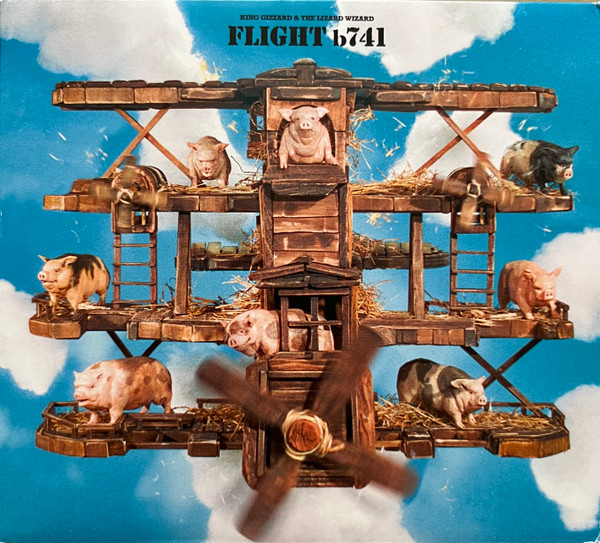King Gizzard & The Lizard Wizard- Flight b741
- Luke Bower
- Aug 20, 2024
- 4 min read
King Gizzard & The Lizard Wizard just cannot stay away. With their latest (and twenty-sixth) offering Flight b741, they continue to prove themselves masters of traversing the genre spectrum. To give you some deeper insight into the album, Luke Bower explores
As the prolific 6-piece Australian psych-rock outfit continue to expand their constantly evolving sonic palettes, it has become no easy task to inaugurate new listeners to King Gizzard and the Lizard Wizard. Their discography now boasts a catalogue of 26 studio albums spanning just over 10 years, amongst a dedicated live album output, bootleg record program, 3 hour marathon live sets and even the release of their own label, p(doom) records, that houses a plethora of creative efforts from members of the band. All the while, Gizzard has amassed a cult-like dedication from fans, who attend multiple tour dates in the hope of seeing discography deep cuts in the band’s ever-changing setlists.
Their versatility, however, lies most prominently in the seamless ways that they push themselves musically, without straying too far into absurdity through setting boundaries and perimeters to what they want to achieve with each new release. Each record is razor sharp in its genre and conceptual focus, as seen with their two 2023 releases for instance, one of which being a foray into apocalyptic thrash metal, and the other an exercise in hypnotic synth-electronica. It’s clear that their talents lie in their malleability as musicians, with them often being cited as chameleon-like in their ability to contort into whatever genre suits them next. Latest effort Flight b741 is no exception of this Gizzard ethos, yet its release feels like a breath of fresh air amidst the often dizzying complexity of the band’s more recent records.
Flight b741’s songwriting approach leans heavily into the band’s newfound jamming excellence, with lead vocalist Stu Mackenzie detailing its essence of sporadic collaboration and animalistic instinct in a recent documentary following the making of the album directed by Guy Tyzack, which can be found on the band’s YouTube. It results in a record that doesn’t take itself too seriously, yet stills obeys the common thread of the band’s environmental protection manifesto that is seen on nearly all of their albums (albeit sometimes more abstractly - take 2019’s Infest the Rats Nest’s climate change commentary, told through a sci-fi narrative of humanity fleeing Earth).
Opener Mirage City on Flight b741 paves the runway instantly for the album’s boogie blues rock focus, with guitar riffs reminiscent to AC/DC’s Riff Raff and lyricism focusing on themes of escapism and ambition. Its raucous energy manifests in the track’s final minute, which almost sounds as if Elton John took too much acid and decided to front a psychedelic rock band in his heyday. Gizzard continue their ambush on 1970s rock pastiche with following tracks Antarctica and Raw Feel, the latter of which ripping with infectious instrumentation, group harmonising and time signature experimentation. Hog Calling Contest is undoubtedly a highlight; a cartoonish and rambunctious whirlwind of a song that blisters through its runtime at a break-neck pace.
If there’s any take away from the album in its entirety however, is that the group’s singing has never sounded better. Ambrose Kenny Smith shines in this department as usual, who one minute delivers luscious vocal passages, and the next demonstrates erratic harmonica expertise. Sad Pilot shows off Joey Walker’s sumptuous vocals too in its first verse, a track I was lucky enough to hear during their headline set at Wide Awake festival earlier this summer.
The record also boasts vocal debuts from the band from bassist Lucas Skinner and drummer Michael Cavanagh, with Cavanagh delivering a highlight performance on lead single Le Risque. The song soars high in the album’s tracklisting, with a textbook display into the best of what the record’s blues rock formula has to offer: simplicity and a driving energy spearheaded by Mackenzie’s familiar guttural growls at the end of the track.
Unfortunately, the album begins to trip over itself once Gizzard loses focus of what makes its simple blues formula so great. Songs such as the title track and Rats in the Sky falter and become muddled in their coherency, making the album’s back half less memorable and more meandering in its execution than the tracks before it. Whilst the album is nothing to write home about in the grand scheme of Gizzard’s behemoth of a discography in this sense, it’s not to say that the album is without its merits. It essentially operates as the spiritual successor to 2019’s Fishing for Fishies, and acts as a vessel in which Gizzard evidently seem to continue to have fun in their album creation process, which is all one can hope for 26 albums deep into their career. Flight b741 concludes with Daily Blues, a hammed up, exaggerated track laden with tempo changes and the sharing of vocal responsibilities from the band, that signs off with Mackenzie thanking its listener for flying; a cheesy yet wholesome message to see out the record.
Flight b741 is an album that begs to be danced along to in a live setting, a sentiment that is all too familiar to every release of King Gizzard and the Lizard Wizard. With a huge US and Canada tour fast approaching, and support from Geese in tow, Gizzard continue to ascend in their status of 21st Century psych-rock royalty with every imminent release.
Luke Bower
Edited by Alice Beard
Official Flight b741 album cover courtesy of King Gizzard & The Lizard Wizard, video courtesy of King Gizzard & The Lizard Wizard on Youtube





Comments